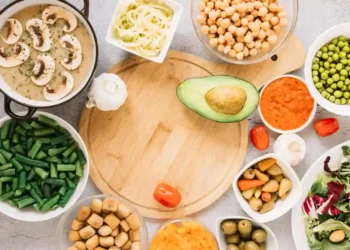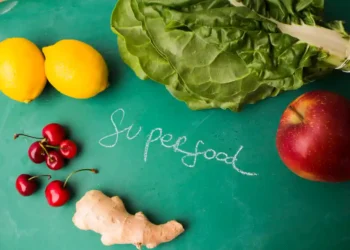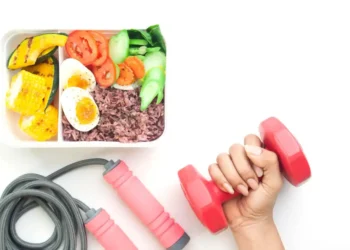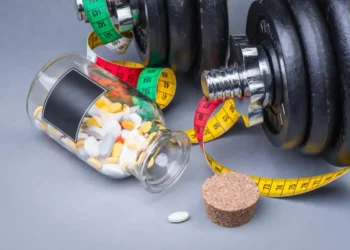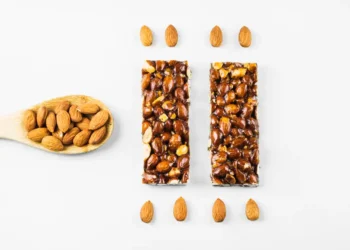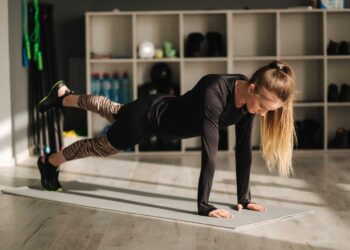Did you know that timing your meals right greatly helps with your fitness goals? If you’re an athlete wanting to perform better or just someone who loves to work out, you need to eat at the right times. What you eat and when you eat it can make your muscles heal faster, fill up your energy, and help you recover better.
Key Takeaways:
- Meal timing is a critical factor in optimizing recovery and achieving fitness goals.
- Proper nutrition before, during, and after exercise can enhance performance and support muscle repair.
- The composition of meals, including macros like protein, carbohydrates, and fat, varies based on individual factors and exercise specifics.
- Timing nutrition based on exercise time can help fuel workouts and optimize energy levels.
- Post-workout nutrition, consumed within the “anabolic window,” aids in refueling and muscle recovery.
How Nutrition Impacts Performance and Recovery
Eating right is key for top sports performance and quick recovery after workouts. By choosing the right foods, you boost how well you play, slash injury dangers, and help your body heal fast.
A balanced diet packed with protein, carbs, and good fats is crucial for top sports feats and bounce-back power. These nutrients each play a special role. They help your athletic game and get you ready for the next round.
Protein rebuilds and grows strong muscles, making it a must after tough workouts. Add foods like lean meats, eggs, and plant proteins (tofu and beans) to your meals. They help your muscles heal and get stronger.
Carbs are your muscles’ main power food during workouts. Eating enough before means more energy for your game and a better performance. Foods with lots of carbs like whole grains and fruits belong in your pre-game meals.
Fats are key for health and should be part of your diet in the right amounts. They give a big energy boost and help your body work well. Go for good fats from avocados, nuts, and fish to fuel your best plays and recovery.
“Proper nutrition is vital for athletes and active individuals as it can have a significant impact on both performance and recovery.” – Dr. Sarah Johnson, Sports Nutritionist
Water is as important as food for great sports results and fast healing. It helps keep your body cool, your joints smooth, and carries nutrients and oxygen to your muscles. Don’t forget to drink plenty, before, during, and after exercising.
Remember, the right nutrition for you depends on things like your body type, your sport, how hard and long you train, and how often. A pro nutritionist or dietitian can create a plan that meets your unique needs and goals.
Sticking to the right nutrition plan not only boosts your performance but also lowers injury risks and speeds up your recovery. It ensures you’re well-fueled for sports success.
| Nutrient | Role | Food Sources |
|---|---|---|
| Protein | Muscle repair and growth | Lean meats, eggs, dairy products, tofu, legumes |
| Carbohydrates | Energy source for muscles | Whole grains, fruits, vegetables |
| Fats | Energy source and overall health | Avocados, nuts, seeds, fatty fish |
References:
- Healthline – Nutrition for Athletes: What to Eat Before, During, and After Exercise
- American Council on Exercise – Eating and Exercise: 5 Tips to Maximize Your Workouts
- International Olympic Committee – Nutrition for the Athlete
What to Eat Before Exercising
Eating right before working out is key. It fuels your body and boosts your performance. The meal you eat before makes sure you have energy during your workout and helps you recover after. So, focus on eating the right mix of carbs and protein.
Carbs give your body energy. Eating them before exercise keeps your blood sugar level stable. This helps your muscles work well. Choose from whole grains, fruits, and veggies like sweet potatoes for your carbs.
Protein is also vital for your pre-workout meal. It helps your muscles repair and grow. This nutrient also stops muscles from breaking down while you exercise and helps you recover later. Try to eat lean proteins such as chicken, fish, eggs, or vegetarian options like tofu or beans.
Try not to eat high-fat foods right before working out. They can slow down your digestion and make you feel uncomfortable. Eat your pre-workout meal 1-3 hours before your workout to give your body time to digest well. This helps prevent stomach issues when you’re active.
Don’t forget to drink enough water before working out. Dehydration can cause tiredness, muscle cramps, and might lower your performance. Drink water or a sports drink before you start. Keep sipping water during your exercise to stay hydrated the entire time.
In short, what you eat before you exercise really matters. Aim for a meal that balances carbs and protein and skips unnecessary fats. Plus, drinking enough water is crucial. Doing these things helps you perform better and reach your fitness goals.
Timing Nutrition Based on Exercise Time
The time of day you work out plays a big role in when you eat. For the best results, it’s key to eat the right foods at the right time. This is vital whether you hit the gym in the morning or evening. Changing when you eat can boost how well you do and recover from your workouts.
For Morning Workouts
Working out in the morning? It might not be wise to chomp down a big meal just before. A hefty meal might leave you feeling stuffed and slow. This could hurt your exercise. If mornings are your exercise time, a light smoothie or skipping breakfast could be smart. It lets your body use its own energy. It might even help burn fat while you work out.
For Endurance or High-Intensity Workouts
If you’re gearing up for a big endurance or high-intensity workout, what you eat before is important. These kinds of exercises need steady energy. A meal that mixes carbs and protein is ideal. It helps power you through and aids muscle healing later. For longer workouts, adding carbs is good to keep you going and push off tiredness.
For Evening Workouts
Exercising at night has its perks. You’ve got more time between eating and working out. This means you can dig into a bigger meal. Top up your energy with carbs that last. A meal with protein, healthy fats, fiber, and carbs can set you up well for your evening activity.
Time and type of meal depend on when you’re going to exercise. Be in tune with your body. Find a rhythm that suits you best. Try different meal plans and see what your body likes. This can help you perform better and feel your best after workouts.
Getting your pre-workout meal right can really help you perform and recover better. Experiment with meal timings to find your winning schedule. When you eat the right things at the right time, you can get the most out of your workouts. And reach those fitness dreams.
The Importance of Post-Workout Nutrition
Post-workout nutrition is crucial for your exercise routine. After working out, your body needs the right food to heal. Eat a good meal soon after working out to help your body recover fast.
Your body uses up energy and breaks down muscles when you work out. Eating right afterwards helps fix your muscles, refill your energy, and get ready for the next workout. This means you get stronger faster and reach your fitness goals sooner.
It’s best to eat both protein and carbs after you exercise. Protein builds new muscles and helps old ones repair. Carbs give you energy and tell your body to use the protein well.
For best results after working out, eat a meal like this:
| Protein | Carbohydrates |
|---|---|
| Grilled chicken breast | Brown rice |
| Salmon fillet | Sweet potatoes |
| Greek yogurt | Fruit salad |
| Protein shake | Oatmeal |
Keep drinking water or sports drinks after you work out. This helps your body recover and keeps you performing at your best.
Focusing on what you eat after working out can boost your recovery and muscle growth. Stick to a good eating plan to make your exercise work better for you.
Debunking the Eating Before Bed Myth
Many believe eating before bed causes weight gain. But, for those who work out at night, this is false. Nighttime snacks can actually help you recover and boost the benefits of your exercise. This is because eating after working out shifts your body from breaking down muscles to building them up.
Eating before sleep is a good time to get important nutrients. The right meals at night improve your body’s recovery. They help replace energy stores and aid in muscle repair during the night.
“Nighttime nutrition is an essential part of the recovery process. It allows your body to replenish energy stores, repair damaged muscles, and prepare for the next day’s activities.” – Dr. Jane Richards, Sports Nutritionist
To help your body recover well overnight, pick foods that are good for you. Avoid big, fatty meals that could keep you awake. Instead, choose snacks that mix carbs and protein. For example, Greek yogurt with fruits or a turkey wrap on whole-grain bread. Such choices give your body the nutrients it needs without causing sleep troubles.
The Benefits of Nighttime Nutrition:
- Promotes muscle repair and growth
- Replenishes glycogen stores
- Supports protein synthesis
- Provides essential nutrients for recovery
- Optimizes the benefits of exercise
Adding nighttime nutrition to your daily plan boosts recovery and supports your exercise goals. Always keep your health in mind. Listen to your body’s signals. And, choose meals that fit your personal needs and likes.
| Myth | Reality |
|---|---|
| Eating before bed leads to weight gain | Nighttime nutrition is crucial for recovery and promotes muscle repair and growth. |
| Heavy, high-fat meals impair sleep quality | Choose balanced meals and snacks that combine carbohydrates and protein for optimal recovery benefits. |
| Evening exercise diminishes the effects of nighttime nutrition | Exercise in the evening enhances nutrient absorption and switches the body to an anabolic state. |
The Bottom Line
Timing and what you eat really matter for how you perform and recover. Fit your meal choices to your life, like your age, what you do for exercise, and your body size. This way, you get the best mix of what your body needs for recover. Go for meals that have healthy, real foods and mix of macronutrients.
Meal timing takeaways:
- Make your eating plan just right for you, based on what you need.
- Eat meals that have real, wholesome foods.
- Get a mix of nutrients in your meals to boost energy, help recover, avoid injuries, and grow right.
“Proper nutrition is the foundation for optimal performance and recovery. By fueling your body with the right nutrients at the right time, you can enhance your athletic performance, prevent fatigue, and support muscle repair and growth.” – Dr. Emily Harris, Sports Nutritionist
Remember these tips to help you recover well. They make sure your body gets what it needs to do its best. Everyone’s food needs are different, so pay attention to what your body tells you. Adding balanced foods and whole things to your meals can help you reach your fitness aims.
Conclusion
Recovering well after workouts is crucial for reaching your fitness goals. By choosing the best foods at the best times, you can boost your performance and fight off tiredness. This also helps your muscles recover faster.
Be sure to pay attention to your own body and what it needs to eat and when. We’re all unique, so it’s important to figure out what suits you. Try different meal times and see how you feel afterwards.
But, don’t forget, meal timing isn’t everything. The food you eat is vital for fitness goals too. Eat a mix of healthy foods to get all the nutrients you need. This is key for staying energized and recovering well.


